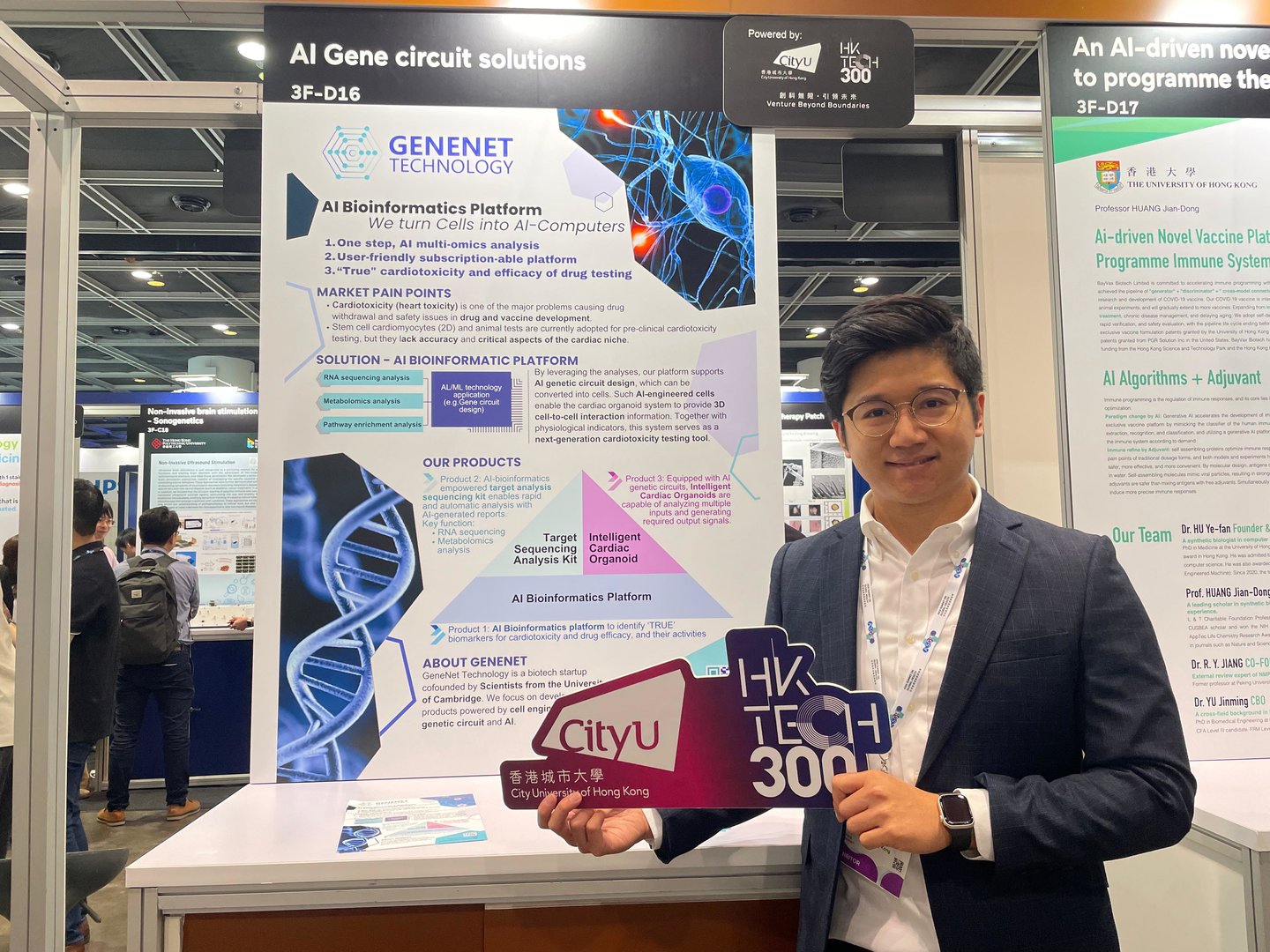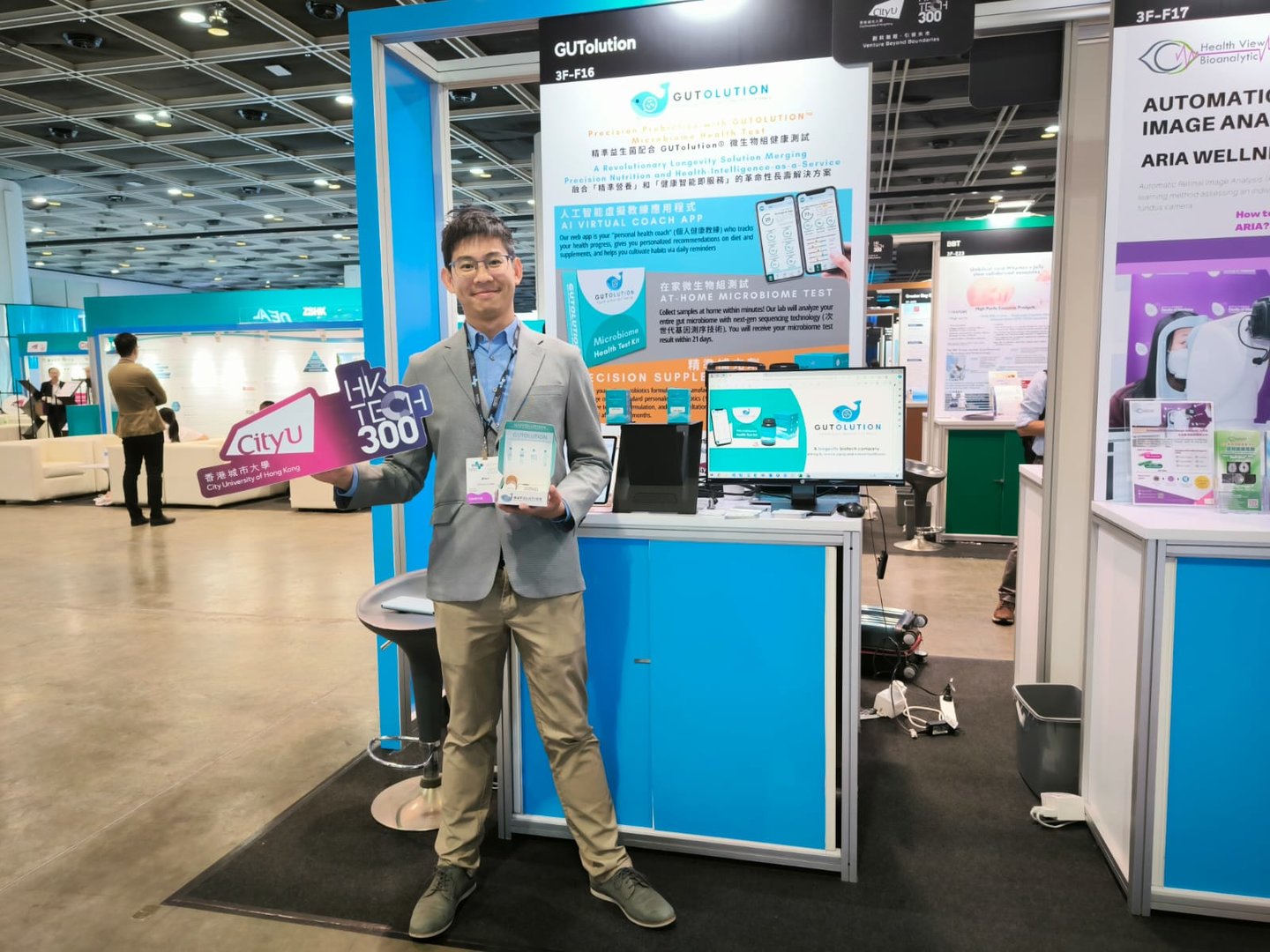Cross-regional and cross-sectoral collaboration to address global health challenges – HK Tech 300 participates in the Asia Summit on Global Health

As Hong Kong strives to become a “Health and Medical Innovation Hub”, the 4th Asia Summit on Global Health (ASGH), Asia’s premier healthcare innovation and investment event, was held at the Hong Kong Convention and Exhibition Centre (HKCEC) on 16-17 May. HK Tech 300, of City University of Hong Kong (CityUHK), was one of the healthcare innovation partners of the ASGH, with 10 start-up companies and teams participating in the exhibition. Professor Michael Yang, Senior Vice-President (Innovation and Enterprise) of CityUHK, was a guest speaker at the plenary session, where he and other guest speakers from Japan and South Korea explored how to develop innovative technology through cross-regional, cross-sectoral and interdisciplinary collaboration to provide solutions to global healthcare challenges.
This year’s ASGH is the flagship event of the Hong Kong Trade Development Council’s (HKTDC) International Healthcare Week and was held in conjunction with the Hong Kong International Medical and Healthcare Fair. More than 80 global healthcare business leaders, investors, international research and medical experts, and government and public health representatives attended the summit to discuss in-depth issues, such as global healthcare innovation and investment prospects for the industry.
Hong Kong is rapidly developing into an international innovation centre
In his opening remarks on the first day of the two-day summit at the HKCEC, Mr John Lee Ka-chiu, Chief Executive of the Hong Kong Special Administrative Region (HKSAR), said, “Technology is a policy priority of the HKSAR Government. Thanks to the strong support of the National 14th Five-Year Plan and other national strategies, Hong Kong is rapidly emerging as an international innovation and technology hub.” He also mentioned that collaboration,and partnerships can fast-track innovation; hence the ASGH, which brings together medical research and development intelligence and insights with the latest innovations and technologies and the experts driving them, is a good starting point to foster collaboration.
In addition, the Vice-minister of the National Health Commission, Mr Cao Xuetao, and the Secretary for Health of the HKSAR government, Professor Lo Chung-mau, delivered special remarks at the opening session and subsequent plenary session. Professor Lo discussed the HKSAR Government’s preparations for the establishment of the “Hong Kong Centre for Medical Products Regulation” and the promotion of Hong Kong as a hub for health and medical innovation.
Global agenda relying on interdisciplinary, cross-sectoral and cross-regional collaboration
The first plenary session on the following day was “Advancing Healthcare in Asia through Innovation”, chaired by Mr Bernard Charnwut Chan, Chairman and President of Asia Financial Holdings Ltd. In addition to Professor Yang, the speakers included Dr Sangtae Kim, Chief Scientist of Informatics and Artificial Intelligence at Bertis in Korea, Mr Yasushi Okada, Representative Corporate Officer and Chief Operating Officer of Eisai Co., Ltd., Dr Sarah Salvilla, Group Chief Health Officer of FWD Group, and Mr Danny Yeung, Co-founder and Chief Executive Officer of Prenetics.
At the seminar, Professor Yang mentioned the University’s commitment to nurturing talent to help the younger generation cope with various global challenges, such as another possible pandemic and the ageing of the world’s population, through innovation and technology, and how to narrow the gap between rich and poor in healthcare.
He said that the State is accelerating the implementation of the innovation-driven development strategy to build a strong science and technology country. One step was formulating the “Healthy China 2030” blueprint, which sets out specific plans to improve people’s health, promote the development of the healthcare industry, foster innovation in health science and technology, and build up health information services. In recent years, the HKSAR government has also actively promoted a number of policies, such as allocating substantial funds in the new budget, including HK$6 billion for the establishment of life and health technology research institutes, to promote scientific research, transformation and development in the field of life and health technologies to further integrate them into the overall development of the country.
CityUHK is committed to nurturing talent and promoting the industrialisation of scientific research to help Hong Kong become an international innovation hub. Professor Yang pointed out that this year, CityUHK set up the Academy of Innovation and the Institute of Digital Medicine to nurture a new generation of future innovation talent with a new pedagogy. “A global agenda requires global collaboration, and it is only through interdisciplinary, cross-sectoral and cross-regional collaboration that we will be able to meet present and future challenges,” he said.
The Academy of Innovation offers a range of innovation and entrepreneurship programmes for undergraduate, master’s and doctoral students. For example, the PhD by Innovation is a research graduate programme that requires students to carry out innovative and market-driven research projects under the guidance of industry experts, unlike other traditional PhD programmes, in which research topics are provided by the supervising professors. In addition, the programme not only emphasises the publication of a thesis, like traditional PhD programmes, but also requires the students to submit a business plan, apply for patents for the results of their scientific research, and transform them into practical applications. Another example is the Academy’s Overseas Start-up Technology Entrepreneur Programme (STEP), for undergraduates. Instead of attending classes at overseas universities, the students are provided internships at start-ups in regions and cities in which science and innovation are thriving to help prepare them for the path of innovation and entrepreneurship in the future.
This aim of the Institute of Digital Medicine is to promote research and development in the integration of life and health technologies, data science and artificial intelligence with medicine and public health, to capitalise on CityUHK’s strengths in research in engineering, data science and life sciences, and to proactively collaborate with medical faculties of world-renowned universities, clinical practices and industry partners. The Institute signed collaboration agreements with the Yong Loo Lin School of Medicine at the National University of Singapore, Tsinghua University in Beijing, and a number of other prestigious overseas universities.
HK Tech 300 provides all-round support to promote the application of research results
Professor Yang also emphasised that one of the roles of the University is to promote the transformation of research conducted at the University into practical applications through licensing and start-ups. “In order to link University research with industry and the community, and to promote the application of research findings by researchers, CityUHK launched a large-scale innovation and entrepreneurship programme, called HK Tech 300, in 2021,” he said. “The University set up its own seed fund and angel fund to help start-ups overcome the ‘valley of death’. To date, it has nurtured more than 140 start-ups, each of which has secured HK$1 million in angel investment. About 20% of the start-ups focus on biotechnology and health technology.”
Professor Yang added that viruses and other global challenges do not distinguish between national borders or political views, so CityUHK actively promotes collaboration with overseas organisations. The Institute of Digital Medicine has established partnerships with a number of overseas universities and organisations, and HK Tech 300 has promoted exchanges and cooperation among science and technology start-ups from different parts of the world by organising innovation and entrepreneurship competitions in the Mainland and Southeast Asia to facilitate their entry into each other's markets.
Professor Yang also exchanged views and insights with other guests on topics such as disease diagnosis and treatment, the ageing population, and the integration of artificial intelligence into healthcare.
An InnoHealth Showcase and Exhibition Area was set up at the Summit, where more than 150 healthcare start-ups showcased their projects and services in the fields of medicine and therapy, smart medicine, medical devices and diagnostics, community health and wellness, and so forth. More than 70 start-ups were organised by six universities in Hong Kong and Cyberport, and investment and collaboration opportunities were promoted at the venue.
Below are the 10 start-up teams (*seed fund teams) supported by HK Tech 300 that participated in the exhibition at the Summit:










At least five start-ups supported by HK Tech 300 angel fund investment also participated in the Hong Kong International Medical and Healthcare Expo on the same day.